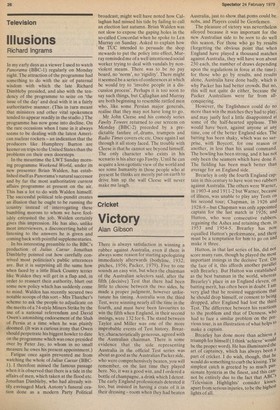Cricket
Victory
Alan Gibson
There is always satisfaction in winning a rubber against Australia, even if there is always some reason for starting apologizing immediately afterwards (bodyline, 1932; pitches, 1956; Packer, 1979). Five to one sounds an easy win, but when the chairman of the Australian selectors said, after the fifth (decisive) Test that there had been little to choose between the two sides, he made a proper judgment, however unfortunate his timing. Australia won the third Test, were winning nearly all the time in the fourth, and must have been favourites to win the fifth when England, in their second innings, were 132 for 6. The stand between Taylor and Miller was one of the more improbable events of Test history. Brearley, characteristically generous, agreed with the Australian chairman. There is some evidence that the side representing Australia in the official Test series was about as good as the Australian Packer side, who were comprehensively beaten, you will remember, on the last time they played here. No, it was a good win, and I ordered a bottle of champagne, a drink which I detest. The early England professionals detested it too, but insisted in having a crate of it in their dressing — room when they had beaten Australia, just to show that poms could be nobs, and Players could be Gentlemen.
The pleasure of victory was nevertheless alloyed because it was important for the new Australian side to be seen to do well this season. For those who go by results (forgetting the obvious point that when England have played a thousand matches against Australia, they will have won about 250 each, the number of draws depending upon the regulations in force at the time): for those who go by results, and results alone, Australia have done badly, which is why Packer has had better crowds. But no, this will not quite do either, because the Packer Australians were far from allconquering.
However, the Englishmen could do no more than win the matches they had to play, and may justly feel a little disappointed at some of the half-hearted applause. This would have 'been, against anyone at any time, one of the better England sides. The batting has been shaky, which was no surprise, with Boycott, for one reason or another, in less than his usual command. The bowling has been strong, and it has not only been the seamers which have done it. The fielding has been much better than average for an England side.
Brearley is only the fourth England captain in this century to have won two rubbers against Australia. The others were Warner, in 1903-4 and 1911-2 but Warner, because of illness, was unable to play any Tests on his second tour; Chapman, in 1926 and 1928-9 — but Chapman was only appointed captain for the last match in 1926; and Hutton, who won consecutive rubbers, regaining the Ashes and retaining them, ill 1953 and 1954-5. Brearley has now equalled Hutton's performance, and there must be a temptation for him to go on and make it three.
Hutton, in that last series of his, did not score many runs, though he played the most important innings in the decisive Test. On the face of it, this affords another parallel with Brearley. But Hutton was established as the best batsman in the world, whereas Brearley's place in an England eleven, on batting merit, has often been in doubt. I ant very glad that he resisted suggestions that he should drop himself, or consent to being dropped, after England had lost the third Test. The difference between his reactions to the problem and that of Denness, who had to face a similar problem on the previous tour, is an illustration of what helps t° make a captain.
Brearley has done more than achieve a triumph for himself ( I think 'achieve' would be the proper word). He has illuminated the art of captaincy, which has always been 3 part of cricket. I do wish, though, that he would do something to curb the kissing. The simplest catch is greeted by so much Passionate hysteria as the finest, and this cannot be entirely due to the fact that ABC's 'Television Highlights' consider kisses, apart from serious injuries, to be the highest lights of all.


































 Previous page
Previous page